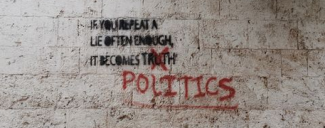This webinar will focus on how misinformation, denial and distortion of facts, and other aspects of post-truth politics take shape in different European countries. Researchers from Denmark, Finland and Switzerland will discuss their recent and ongoing research with a focus on how the politicized rhetoric of immigration, racism and misogyny is constructed and challenged in media environments.
The webinar will be held on Zoom on 29 April 2021 at 14:15 -15:45. Registration by 27.4 at https://elomake.helsinki.fi/lomakkeet/93121/lomakkeet.html. Facebook event: https://www.facebook.com/events/886887822162841.
The presentations from the speakers — Peter Hervik, Tuija Saresma and Heikki S. Mattila — will be followed by a discussion. Moderator: Gwenaëlle Bauvois, researcher (CEREN).
Strategic Ignorance of Experiences and Reactions to Racialization in Denmark
Peter Hervik
A recently completed research project has found a recurrent theme of misinformation, distorted information, reframed oral discourse, denial of facts, and carelessness about facts are occurring frequently in media coverage, media consumption and commentaries. This is particularly outspoken, it seems, in the field of racism-studies and anti-racism activism. Denmark have moved to the forefront of anti-migration and anti-Muslim political programs, hostilities and initiatives, ignorance referring to issues of concern about racialized minorities and securitization. The project asked basic research questions such as how Danes at different ages and sectors form knowledge about immigrants, refugees, and ethnic minorities in Denmark? Where do people get their knowledge from? How do people come to know what they know?
In this webinar, Peter Hervik presents the subproject called “Danish Exclusionary Reasoning in Social Media and Web-news commentaries” that looked into the popular media and the news media as key sources of information about minorities. He and his team found racialization and the mechanisms of racism to be present also in some anti-racism scholarship and activism. Two key themes emerged as particularly troubling and intellectually challenging, ignorance and the willingness to dismiss basic notions of what it means to be human, as well as the embrace of a fractal logic of a ‘Danish nation in danger’ and what appears to be a spin-off fractal “I am my body” with activism evolving around a sharp division of racial categories.
Peter Hervik is PhD, Docent, Social Anthropologist and Migration Scholar. He is Independent Scholar and Member of NOISE – Network of Independent Scholars of Education. Formerly he was Professor at Aalborg University. He is the head of the team research project SERR “Study of Experiences and Reactions to Racialization in Denmark)”, 2015-2021. His two most recent books are: “Racialization, Racism and anti-Racism in the Nordic Countries“. (ed.). Palgrave MacMillan, (2019) and Digital Hate. Global Perspectives on Online Extreme Culture, co-edited with Sahana Udupa and Iginio Garliardone. Indiana University Press (2021).
Right-wing populist politics of knowledge online: from ‘immigration critique’ to criticizing academic research
Tuija Saresma
The question of truth is essentially a question of epistemology. In the current ‘post-Truth era’, academic knowledge is undervalued and instead, self-proclaimed experts by experience have become credible sources of knowledge for growing audiences. Consequently, central questions of feminist epistemology – what is knowledge, is it or should it be positional, who can know, what can be known, what and whose experiences should or should not be researched – have become even more topical.
In this presentation, Tuija Saresma addresses this new post-truth politics of knowledge that connects to the ways in which right-wing populists in Finland produce and spread ‘alternative’ knowledge about and against academic knowledge. She focuses on a recent case in which a study on misogynous hate speech and targeting female politicians was attacked on social media, and demonstrate how harassing and ‘dog-piling’ on Finnish Twitter are used to question and to disparage academic knowledge.
Tuija Saresma is a senior researcher in Research Centre for Contemporary Culture, the Department of Music, Art and Culture Studies. She holds a Title of Docent in Culture Studies and Gender Studies at the universities of Jyväskylä and Eastern Finland. Saresma’s most recent publications include a co-edited anthology Violence, Gender and Affect (Palgrave 2021) and co-written journal articles “The Role of Social Media in the Rise of Right-Wing Populism in Finland” (in Tumber & Waisbord [eds.], The Routledge Companion to Media Misinformation and Populism, forthcoming); “Performing ‘Us’ and ‘Other’: Intersectional Analyses of Right-Wing Populist Media” (European Journal of Cultural Studies, 2021); “Poliittisten toimijoiden kokema vihapuhe sukupuolittuneena väkivaltana [Hate speech experienced by political actors as gendered political violence]” (Sukupuolentutkimus – Kvinnoforskning 2020); and “Discursive Constructions of White Nordic Masculinities in Right-Wing Populist Media (Men and Masculinities, 2018). She is the co-chair of the Association of Gender Studies in Finland (SUNS) and the treasurer of Association of Cultural Studies (ACS).
Same tricks everywhere? Comparisons of the discursive strategies of some European populist parties
Heikki S. Mattila
In his ongoing research that Dr Mattila will discuss in our webinar, he is comparing European populist movements and their discursive strategies especially on immigration policy. Although nationalist in their orientation, European populist parties however seem to emerge from internationally shared roots, tapping into the discontent and insecurity created by the recent decades’ diminished industrial employment, strengthened influence of international institutions, the perceived toothlessness of national mainstream parties, integration problems with some immigrant groups, or greater visibility of sexual minorities. Populist parties all over also employ mutually similar arsenals of discursive strategies, one of the most common being discursive construction of adversaries, such as the projected enthusiasm of other parties on immigration, “exaggerated” environmental activism, or the perceived threat of sexual minority rights or feminists to traditional family model. Some populist figures regularly produce racist media splashes, followed by calculated ambivalence of their party leadership, to alternately take distance from but then again flirt with extremist supporters. To add confusion, as part of their communicative repertory, on some themes the populists also join the consensus of mainstream parties. With their mostly vocal and aggressive style, the populists have taken initiative in migration issues, and compared to most other parties, evoke stronger emotional identification among their voters.
Dr. Heikki S. Mattila holds MA (Economics and Sociology) from University of Helsinki and PhD (sociology) from University of Geneva. An expert in international migration, Dr. Mattila combines work experience in government, international organizations and academia. He worked in 1990-95 in the Finnish Ministry of Labour, then with the International Organization for Migration (IOM) in 1995 -2008, in Helsinki, Geneva and Budapest. In 2011-2014 Dr Mattila did consultancy work for IOM in Africa (Nigeria and Chad) and in the Middle East (Turkey and Jordan). Since 2014 Dr Mattila has worked with the School for International Training (SIT) Switzerland, currently in a study-abroad programme called “International Studies and Multilateral Diplomacy”, directed to undergraduates from American universities. He also lectures on migration and refugee topics at Webster University in Geneva, and has written on labour migration, trafficking in migrants, migrants’ rights and migration debates and discourses.

 NordEthics
NordEthics